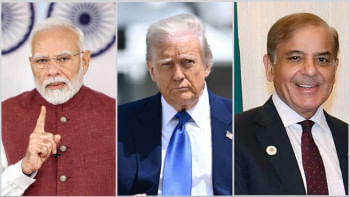FDI down on slow decisions, political worries
Foreign direct investment (FDI) declined by 27 percent during last 11 months of the fiscal year (FY07) compared to a year earlier due to political instability and the failure to reach decisions on large-scale investments.
According to the Bangladesh Bank, in the 11 months to May,
$495 million FDI flowed into the country against $ 675 million in the same period in FY06, and was well below the record year FY05 when it reached $846 million.
Poor infrastructure, bureaucratic complexities and confrontational politics are the main hindrances to foreign direct investment (FDI) in Bangladesh, the Asian Development Bank (ADB) said in a research paper released recently.
The lack of urgency in dealing with investment proposals also undermined the country's chances, according to the Bangladesh Institute of Development Studies (BIDS)
"The government failed to negotiate with prospective foreign investors," Dr Zaid Bakht, BIDS research director, told The Daily Star.
Bakht referred to power projects, many of which were attractive to foreign investors. However the government had failed to conclude the necessary negotiations.
"Negotiations with prospective foreign investors have been delayed mainly due to the vested groups' ill motives; to their desire to make huge amounts of money from the deals. That is why there has not been any investment," he said.
Dr Debapriya Bhattacharya, Executive Director, Centre for Policy Dialogue, said the country had experienced serious political turmoil during the past 11 months and this was the main reason behind the negative growth of FDI.
Since October 2006 the country had experienced three different governments leading to a discontinuity in dealing with investment proposals. Moreover, foreign investors have been reluctant to push projects due to a fear that decisions may be reversed.
Khondaker Golam Moazzem, research fellow of the CPD, said no big foreign investment had taken place in Bangladesh since 2001.
"FDI increased in FY05 as service sector foreign investors reinvested their earnings, but such reinvestment declined in the last fiscal year resulting in an increase in profit repatriation," he explained.
Moazzem referred to the negotiation process with the Indian industrial giant Tata and said the government's approach had sent a negative signal to other prospective foreign investors.
Bangladesh Bank data shows that investors repatriated $175m in profit in 2001, while figure was $195m in 2002, $355m in 2003, $338m in 2004 and $418m in 2005.
According to the Board of Investment (BOI), investment in telecommunications sector accounted for 36 percent of the total FDI, textiles 18 percent, chemical industries 7 percent, oil companies 18 percent, banks 10 percent and power companies 2 percent.

 For all latest news, follow The Daily Star's Google News channel.
For all latest news, follow The Daily Star's Google News channel. 



Comments